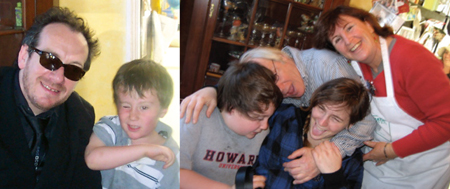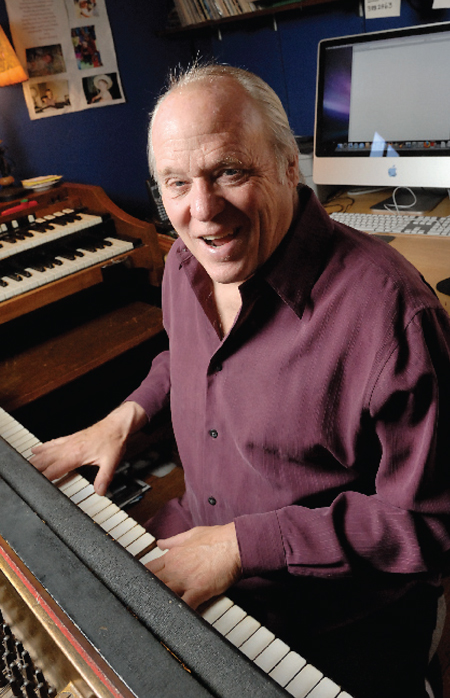The members of the de Lone family — Austin, Lesley, Caroline and Richard — are a weekend fixture in Lytton Square. As they stroll across the red brick plaza, they attract numerous hellos and hugs from the well-heeled and shoeless alike , and for good reason.
For three decades, Austin — known more familiarly as Audie — has graced the Marin music community with his soulful piano playing, an encyclopedic knowledge of music history and a confident, easygoing stage presence. He has collaborated with, inspired or booked many of the best rock musicians of his era and earned industry-wide respect.
Those musicians are now returning the favor.
Soon after Austin’s son, Richard, was born in 1998, he was diagnosed with Prader-Willi syndrome, a debilitating and rare genetic disorder that has stunted his development and made him unable to care for himself. When the disease tested the limits of the de Lone family’s financial and emotional resources, the local music community stepped in, proving the truth of the Beatles lyrics “I get by with a little help from my friends.”
“Many people turn to their church in times of need,” says Lesley, Austin’s wife of 25 years. “We don’t go to church, so we turned to the music community. Musicians are an eclectic group of sensitive souls and when it comes to Richard, they have been 100 percent supportive.”
The de Lones have started a foundation — The Richard de Lone Special Housing Project— whose goal is to raise $5 million in order to build a special home for people with Prader-Willi. Last year, the effort got a big financial boost from Elvis Costello, who performed at a benefit for the organization in San Francisco with Clover, the Marin band that backed Costello on his first album, My Aim Is True. Another round of musical fundraisers is scheduled for October 2–3, also at the Great American Music Hall, featuring Jim Keltner, Ry Cooder and Nick Lowe.
There’s also a good chance Costello will stop by, says de Lone, because they’ll be playing together at the Hardly Strictly Bluegrass Festival in Golden Gate Park that weekend. “It’s going to be another wild and wooly adventure at the Great American Music Hall,” he says.
The de Lone family lives in a small two-bedroom home on Plymouth Avenue in Mill Valley’s Sycamore Park neighborhood. A few years back, it became apparent that Richard couldn’t live at home full-time. While he still attends a special education class at Olive Elementary School in Novato, during the week he lives at a residential facility in Greenbrae, returning home on the weekends.
Seated at a picnic table beneath a sprawling apple tree in a backyard, decorated with pots (some planted, some empty), a trampoline, a wayward bag of soil and half-finished projects intended for Lesley’s floral business or her job as a personal chef for Sausalito novelist Catherine Coulter, the de Lones talk about how life has changed in their quarter century in Mill Valley.
Austin moved into the house in 1972. He recalls those early days with fondness. “I love the house, love the neighborhood,” he says. “When I first moved in, it was total Americana, with manicured front lawns, and picket fences, but there wasn’t that much of a community. When Caroline was young, a sort of magic happened, with kids running in and out of houses, spontaneous cocktails parties and block-wide Easter egg hunts. It was almost like it wasn’t real — Ozzie and Harriet kind of stuff.”
The yard once had a full view of Mount Tam to the west. Today, the peak is barely visible behind the latest supersized remodel in this coveted neighborhood. “And to think I used to sunbathe naked out here,” says Lesley, with a nod toward her neighbor’s windows just over the fence. “At least we can still see our mountain.”
Richard, teetering on the concrete steps leading to the backyard, interrupts the conversation. He wears his sister’s knock-off Burberry Wellies, a diaper and a striped T-shirt. He smiles and idly swings one of Lesley’s purses. Richard is a 120-pound (and growing) bundle of energy, unconditional love and — unfortunately — appetite. Prader-Willi causes (among other conditions) an insatiable hunger that usually leads to morbid obesity. Families must lock up all food. Richard’s face, framed by thick dark brown hair, is smudged with chocolate — he’s found a Cadbury egg in his mother’s purse.
The de Lones must keep the front door bolted as well. Richard leaves the house and wanders. In the past, he has made his way to a video store on nearby Miller Ave. Lately, he’s had an affinity for three neighboring homes.
As Lesley gets up to do a chocolate intervention with Richard, de Lone talks about the goal of his foundation. “The new home will be a facility specifically for the Prader-Willi population,” he says. “It will have a lock-down kitchen and will be designed to meet their various unique and specific needs. We also plan for it to have recreational facilities, a gym, a pool, and connections to the medical community.”
Inside the family’s 900-square-foot home, original paintings by George Frayne (Commander Cody) hang in the living room. “Sometimes I took art, instead of cash,” says Austin, pointing to various pieces around the room.
In Austin’s combination music-storage room, Caroline, a Tam High junior, sits at the computer browsing Facebook pages. Lesley points out family heirlooms, including a large photo of Austin’s great-great grandmother, a doyenne of Philadelphia society. A black chipped grand Steinway fills most of the room. The great-great grandmother bought in 1915. “His family came over on … Audie, what boat was that?” asks Lesley. “Some came over on the Mayflower,” he responds, reluctantly.
The healing power of music
Austin, 60-something, reflects on his musical journey. “When I was 6,” he says, “I wanted to be a doctor. And when I was 12, I wanted to be a jazz piano player—so I think it worked out.”
Music has become de Lone’s medicine. “Music has a spiritual power, in that it speaks to everybody,” he says. “Different music speaks to different people. It lifts the spirits and is a great healer.”
De Lone launches into a story about being seasick as a boy on his family’s boat. Lying miserably there in the cabin, he turned on the radio and on came his favorite song. Instantly, he felt better. “If you’re terribly sad, music can soothe you; if you’re anxious, it can soothe you,” he says, watching his son. “Take Richie, for example, not only does he love a good boogie-woogie, but many other types of music will relax him. It’s a universal language.”
De Lone speaks this language fluidly. Ray Charles and George Shearing were early influences. He studied at the New England Conservatory of Music, Harvard and Berkeley before landing in Greenwich Village. In 1970, Chas Chandler, the man who discovered Jimi Hendrix, met de Lone and took his band, Eggs Over Easy, to London to record at Olympic Studios, where the Rolling Stones and Led Zeppelin had recorded albums. A weekly gig at a pub called the Tally-Ho in Kentish Town began to sell out. It soon became a four-night-a-week residency that lasted more than a year. de Lone’s original blend of blues, country and rock became known as pub rock. It also caught the ears of an up-and-coming Nick Lowe and a young Elvis Costello.
De Lone eventually fell in love with a British girl—Lesley. He didn’t meet her in a London pub, though, but rather in a Mill Valley bar while visiting a friend.
“The scene in town then and especially at the Old Mill Tavern (today Vasco’s restaurant) was incredible—magical,” says de Lone. “It was an artistic melting pot filled with people like Sam Shepard, Steve Miller, Dan Hicks, Bob Weir, Marty Balin, Grace Slick and any number of hippies, freaks, rednecks, bikers and suits.”
When a new club named the Sweetwater opened, taking over a popular bar called the Office, as in “Honey, I’ll be late at the office tonight,” de Lone fell headlong into that scene. There, he collaborated for years with its owner, Jeannie Patterson, and Village Music owner John Goddard to lead some of the most memorable jams in Bay Area history, making musical gumbo with Jerry Garcia, John Lee Hooker, Albert Collins, James Burton (Elvis Presley’s guitar player), Carla Thomas and Sammy Hagar.
“Austin coordinated the music for every oddball lineup Jeannie and I came up with over the years,” says Goddard. “He’s unlike any musician I’ve ever met, able to inspire and raise the level of performance of everyone onstage with him.”
De Lone continues to play with his bands, the Sophisticated Dudes or Austin de Lone’s Soul Blues Orchestra. Every December, he plays with ex-Moonlighters bandmate Bill Kirchen, Norton Buffalo and the Christmas Jug Band. He’s also eagerly anticipating the reopening of Sweetwater at 32 Miller Avenue.
“What a cool scene it will be when the Sweetwater and Lucy Mercer’s 142 Throckmorton Theatre are both bringing live music to Mill Valley,” he says. “I have lived in Mill Valley for many years and although much has changed about this town, one thing that has remained the same is the wonderful musical community that exists here. It has always been and remains a source of great friendship, strength and indeed help in times of trouble.”
More information about de Lone’s benefit and foundations at rdshp.org.


